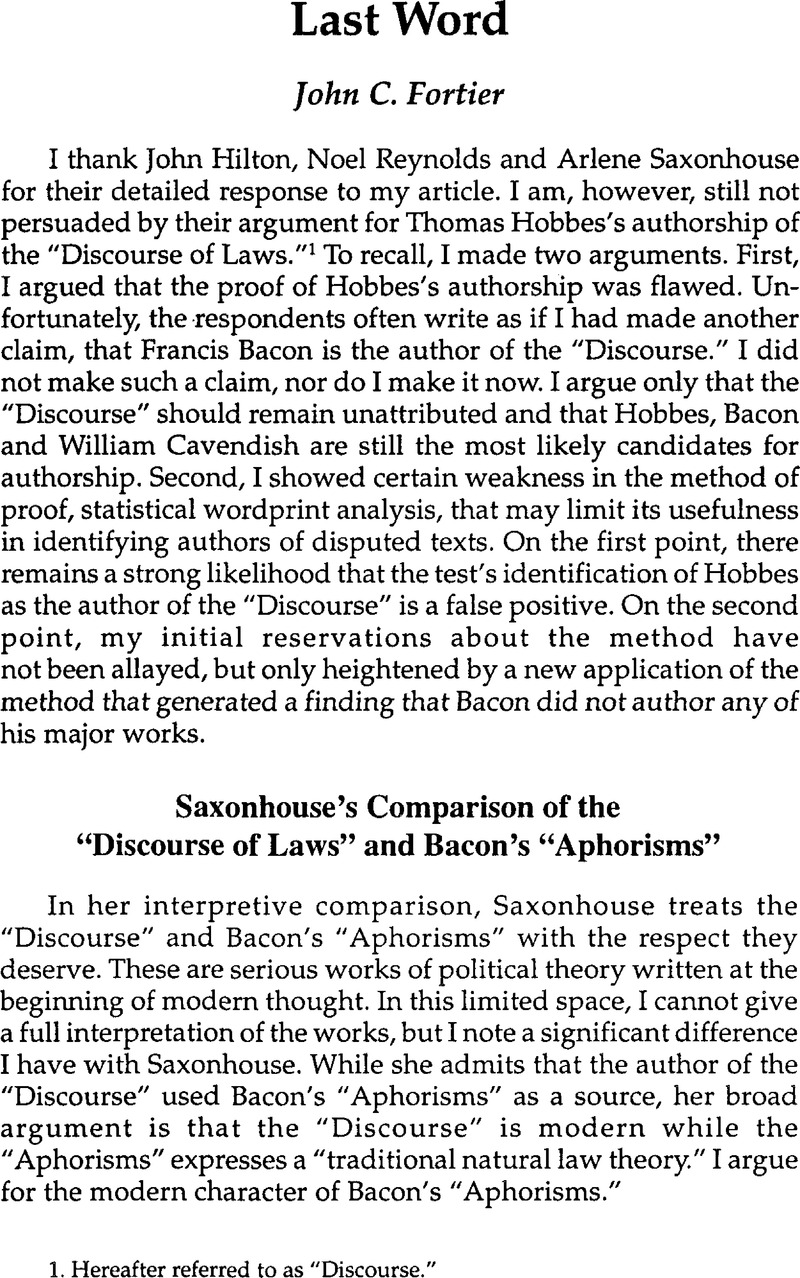Article contents
Abstract

- Type
- Discussion
- Information
- Copyright
- Copyright © University of Notre Dame 1997
References
1 Hereafter referred to as “Discourse.”
2 Hilton, John L., Reynolds, Noel B., and Saxonhouse, Arlene W., ”Hobbes and ‘A Discourse of Laws’: Response to Fortier,” p. 890.Google Scholar
3 Spedding noted the Hobbessian resemblance of the nearly identical second aphorism of Book VIII, chapter 3 of the De Augmentis. Works, ed. Spedding, , Ellis, , Heath, (New York: Hurds & Houghton, 1864), 3: 136 n. 1.Google Scholar
4 Honan, William H., “3 Hobbes Essays Renew Debate over Machiavelli,” New York Times, 20 11 1995, p. B14Google Scholar. Saxonhouse, Arlene W., “Hobbes and the Horae Subsecivae,” Polity 13 (1981): 541–67.CrossRefGoogle Scholar
5 Blumenberg, Hans, The Legitimacy of the Modern Age, trans. Wallace, Robert M., (Cambridge, MA: MIT Press, 1983)Google Scholar; Caton, Hiram, The Politics of Progress: The Origins and Development of the Commercial Republic (Gainesville: University of Florida Press, 1988)Google Scholar; Coquillette, Daniel R., Francis Bacon (Stanford: Stanford University Press, 1992)Google Scholar; Eiseley, Loren C., Francis Bacon and the Modern Dilemma (Freeport, NY: Books for Libraries Press, 1970)Google Scholar; Faulkner, Robert K., Francis Bacon and the Project of Progress (Lanham, MD: Rowman and Littlefield, 1993)Google Scholar; Lampert, Laurence, Nietzsche and Modern Times: A Study of Bacon, Descartes, and Nietzsche (New Haven: Yale University Press, 1993)Google Scholar; Rahe, Paul, Republics Ancient and Modern: Classical Republicanism and the American Revolution (Chapel Hill: University of North Carolina Press, 1992)Google Scholar; Weinberger, Jerry, Science, Faith, and Politics: Francis Bacon and the Utopian Roots of the Modern Age: A Commentary on Bacon's Advancement of Learning (Ithaca: Cornell University Press, 1985)Google Scholar; White, Howard B., Peace among the Willows: The Political Philosophy of Francis Bacon (The Hague: Martinus Nijhoff, 1968)CrossRefGoogle Scholar; Whitney, Charles, Francis Bacon and Modernity (New Haven: Yale University Press, 1986).CrossRefGoogle Scholar
6 Hilton, John L., “On Verifying Wordprint Studies: Book of Mormon Authorship,” BYU Studies 30 (1990): 108 n. 18.Google Scholar
7 Hilton, , Reynolds, , and Saxonhouse, , “Response,” p. 898.Google Scholar
8 Reynolds, Noel B. and Hilton, John L., “Thomas Hobbes and the Authorship of the Horae Subsecivae,” History of Political Thought 14 (1994): 367.Google Scholar
9 “Free-flow words are written without outside influence or superimposed structures that change an author's personal word selection.” Hilton, , “On Verifying Wordprint Studies,” p 90Google Scholar. See also p. 107 n. 4 and Reynolds, Noel, “Statistical Wordprinting” in Hobbes, Thomas, Three Discourses, ed. Noel B. Reynolds and Arlene W. Saxonhouse (Chicago: University of Chicago Press, 1995), p. 161.Google Scholar
10 Strictly speaking, there can be no survival of a wordprint from one language to another. All wordprint tests look for constructions peculiar to one language. When Hilton and Reynolds refer to a pattern coming through in translation, they mean the relatively rare case when a translator translates several works of the same foreign author and the resulting translations show consistent word patterns, Hilton, , “On Verifying Wordprint Analysis,” p. 97Google Scholar. To say this is the original author's wordprint is incorrect. The most one can say is that there is a consistency deriving from the original author's consistent writing in a foreign language combined with a careful translator's consistent rendering of the text.
11 This is a different case from the translator who translates the works of one foreign author with consistency. The point here is that for almost all translators, the constraint of translating does not allow them to write in their normal prose style.
12 Hilton, , “On Verifying Wordprint Studies,” p. 108 n. 18.Google Scholar
13 Fortier, John C., “Hobbes and ‘A Discourse of Laws’: The Perils of Wordprint Analysis,’ p. 882.Google Scholar
14 Hilton, , Reynolds, , and Saxonhouse, , “Response,” pp. 895, 897, 901.Google Scholar
15 Ibid., p. 893 n. 12.
16 “Studium” in Oxford Latin dictionary: “earnest application of one's attention or energies to some specified or implied object, zeal, order. “The examples from the OED make the point. In the same time period (1608–11), Bishop Hall wrote: ”to be carried away with an affectation of fame is so vaine and absurd.” Saxonhouse's own footnote in the recent edition of the Three Discourses also makes the point. There she gives “pursuit” as a synonym of “affectation” (p. 112 n. 16).
17 Hilton, , Reynolds, , and Saxonhouse, , “Response,” p. 892. n. 11.Google Scholar
18 OED, novation.
19 This passage does not occur in a section on changes in the law as Hilton, Reynolds, and Saxonhouse claim (Hilton, , Reynolds, , and Saxonhouse, , “Response,” p. 892Google Scholar), but in a section entitled “On the Origin and Vicissitudes of the Laws,” a title that preserves both meanings of “novationes.”
20 Hilton, , Reynolds, , and Saxonhouse, , “Response,” pp. 895, 891 n. 9, 894 n. 15.Google Scholar
21 E.g., “7. The fraction of the word ‘it’ in which ‘it is the first word of a sentence.’” “11. The fraction of all sentences with ‘with’ in which ‘with’ is the penultimate word of the sentence.” “24. The fraction of all occurrences of ‘as’ in which ‘as’ is followed by another word plus ‘as’ again.” Three Discourses, Appendix 3, pp. 166–169.
22 Hilton, , Reynolds, , and Saxonhouse, , “Response,” pp. 893, 895.Google Scholar
23 Reynolds, Noel B. and Hilton, John L., “The Authorship of Francis Bacon's Works,” International Hobbes Association Newsletter, New Series, 20/21/22 (1996): 1–4.Google Scholar
24 Reynolds, and Hilton, , “Hobbes and Horae,” p. 368Google Scholar; Fortier, p. 885; Reynolds, and Hilton, , “Bacon Authorship,” pp. 1–4.Google Scholar
25 Reynolds, and Hilton, , “Bacon Authorship,” p. 4.Google Scholar
26 Reynolds, , “Statistical Wordprinting” in Three Discourses, p. 157.Google Scholar
- 1
- Cited by




